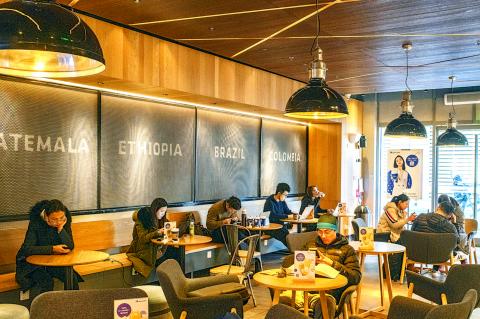Luckin Coffee Inc (瑞幸咖啡), an ambitious start-up that is challenging Starbucks Corp in the race to dominate China’s growing coffee culture, is seeking to raise as much as US$510 million in its US initial public offering (IPO).
The Xiamen-based company said in a filing on Monday that it is planning to sell 30 million US depositary shares for US$15 to US$17 each.
At that range, it would be the sixth-largest of the 53 IPOs on US exchanges so far this year, according to data compiled by Bloomberg.

Photo: Bloomberg
It would also top the company’s earlier plan for a US$300 million share sale described previously by people familiar with the matter.
Including a private placement for about US$50 million with Louis Dreyfus Co, Luckin would have a value of as much as US$4 billion at US$17 a share based on the shares to be outstanding after the listing, according to the filing.
Luckin is spending millions of US dollars a year opening outlets to unseat Starbucks as China’s top coffee company. Since its inception in June 2017, Luckin has quickly expanded into 2,370 stores in 28 cities, with backing from investors including Singapore sovereign wealth fund GIC Pte and China International Capital Corp (中國國際金融).
By the end of this year, Luckin aims to become the largest coffee network in China in terms of number of stores.
It faces an uphill battle against Starbucks, which entered China 20 years ago and dominates with more than half of the market last year, according to Euromonitor.
Luckin held only a 2.1 percent share last year. Starbucks has more than 3,700 outlets in the country and is also expanding at break-neck speed, opening a new store about every 15 hours. It is aiming to have 6,000 sites in China by 2023.
Chasing the entrenched rival has been costly. Luckin said it is burning through US$130 million a year and might continue to see losses in the future.
The company reported a net loss of US$241 million for last year, on total revenue of US$125 million. It lost US$82 million on revenue of US$71 million during the first quarter.

CAUTIOUS RECOVERY: While the manufacturing sector returned to growth amid the US-China trade truce, firms remain wary as uncertainty clouds the outlook, the CIER said The local manufacturing sector returned to expansion last month, as the official purchasing managers’ index (PMI) rose 2.1 points to 51.0, driven by a temporary easing in US-China trade tensions, the Chung-Hua Institution for Economic Research (CIER, 中華經濟研究院) said yesterday. The PMI gauges the health of the manufacturing industry, with readings above 50 indicating expansion and those below 50 signaling contraction. “Firms are not as pessimistic as they were in April, but they remain far from optimistic,” CIER president Lien Hsien-ming (連賢明) said at a news conference. The full impact of US tariff decisions is unlikely to become clear until later this month

Popular vape brands such as Geek Bar might get more expensive in the US — if you can find them at all. Shipments of vapes from China to the US ground to a near halt last month from a year ago, official data showed, hit by US President Donald Trump’s tariffs and a crackdown on unauthorized e-cigarettes in the world’s biggest market for smoking alternatives. That includes Geek Bar, a brand of flavored vapes that is not authorized to sell in the US, but which had been widely available due to porous import controls. One retailer, who asked not to be named, because

CHIP DUTIES: TSMC said it voiced its concerns to Washington about tariffs, telling the US commerce department that it wants ‘fair treatment’ to protect its competitiveness Taiwan Semiconductor Manufacturing Co (TSMC, 台積電) yesterday reiterated robust business prospects for this year as strong artificial intelligence (AI) chip demand from Nvidia Corp and other customers would absorb the impacts of US tariffs. “The impact of tariffs would be indirect, as the custom tax is the importers’ responsibility, not the exporters,” TSMC chairman and chief executive officer C.C. Wei (魏哲家) said at the chipmaker’s annual shareholders’ meeting in Hsinchu City. TSMC’s business could be affected if people become reluctant to buy electronics due to inflated prices, Wei said. In addition, the chipmaker has voiced its concern to the US Department of Commerce

STILL LOADED: Last year’s richest person, Quanta Computer Inc chairman Barry Lam, dropped to second place despite an 8 percent increase in his wealth to US$12.6 billion Staff writer, with CNA Daniel Tsai (蔡明忠) and Richard Tsai (蔡明興), the brothers who run Fubon Group (富邦集團), topped the Forbes list of Taiwan’s 50 richest people this year, released on Wednesday in New York. The magazine said that a stronger New Taiwan dollar pushed the combined wealth of Taiwan’s 50 richest people up 13 percent, from US$174 billion to US$197 billion, with 36 of the people on the list seeing their wealth increase. That came as Taiwan’s economy grew 4.6 percent last year, its fastest pace in three years, driven by the strong performance of the semiconductor industry, the magazine said. The Tsai